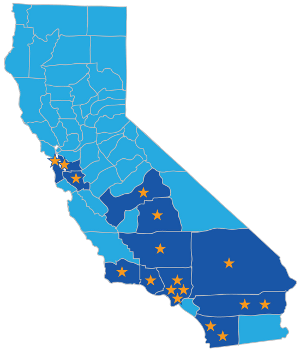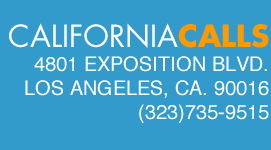It’s been just three years since California Calls began organizing to build a “tipping point” capable of winning progressive tax and fiscal reform. Our progress has been rapid and we are hopeful about the change that’s rising up through California:
- We’ve grown from 9 organizations in 3 counties to 31 organizations based in 12 counties.
- We’ve identified 576,000 supporters of a progressive tax and fiscal agenda, and have turned out a high proportion of unlikely voters to the polls.
- We’ve built collaborations with over 80 organizations, unions and statewide networks.
- We’ve contributed to a strategic shift in the California electorate resulting in progressive policy change.
- And last, but not least, we helped pass an increase on the income tax of the wealthy through Prop 30.
Looking ahead to 2016, the following are four goals California Calls will focus on:
- Building a Formal Power Base of Voters Over nine civic engagement cycles, California Calls has identified 576,000 people who agree with our vision of tax fairness and updating Prop 13. Our work in the coming months will be to transform these supporters into an identifiable political force who consistently vote based on a set of values and a policy agenda – a progressive version of a “tea party voter.” We will be exploring the best strategies to transform this group into a more formal voter base throughout 2013.
- Tackling the Third Rail: Commercial Property Tax Reform. Even with the windfall of new revenue from Prop 30, it is not enough to offset the budget bloodletting that our communities have sustained over the past several decades. A critical piece of the puzzle to generate more revenue lies in commercial property tax reform, one of the pillars of Prop 13. Over the next six months, California Calls, the California Tax Reform Association, and the USC Program for Environmental and Regional Equity (PERE) will engage in intensive research to examine the disparities caused by this dysfunctional system in several regions of the state, and interview 100 stakeholder organizations, including potential non-traditional allies, to explore the best solutions to this problem. Based on this research, California Calls and our allies will craft a mutli-year strategy to win reform of this critical piece of the budget revenue problem. California Calls will also be engaging allies in discussions on other needed reform towards crafting a strategic agenda for 2014 and beyond.
- Effective Implementation of Prop 30. For the first time in more than a decade, California does not face a budget deficit. Governor Brown has proposed significant increases in funding for education, and slight increases to health and human services. Despite this, budget battles are expected, which will pit advocates who want to restore services against Republicans, who although weakened and fewer in number, will use their power to call for more cuts. We will closely monitor and engage in these battles as they arise and keep a watchful eye on the implementation of Prop 30.
- Changing the Story about Government and Taxes Prop 30’s passage wedged a crack in the dominant anti-tax narrative, and indicates a growing willingness among Californians to raise taxes for education and critical services. Over the next few months and years, we will continue to fine tune our strategic narrative to restore faith in government. Sharpening our framing and messaging is key to building a powerful voting bloc in support of long term progressive tax and fiscal reform.


